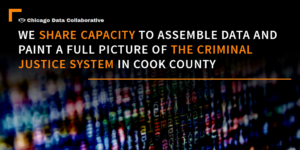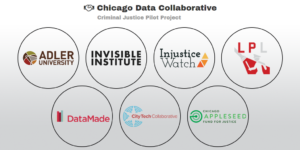Announcing the Launch of the Chicago Data Collaborative
Seven Chicago Organizations Launch Criminal Justice Database
The newly formed Chicago Data Collaborative unites media, advocacy, and tech groups to investigate Chicago’s criminal justice system via cooperative data sharing
Contact information: Rick Tulsky, (510) 295-5832, ricktulsky@injusticewatch.org
Chicago – Seven organizations have announced the creation of a shared database to support criminal justice advocacy and reporting in Cook County. Built on the organizations’ collective information, the new database merges otherwise siloed and hard-to-access data such as police stops and information about people incarcerated in Cook County Jail.

The database was created by the Chicago Data Collaborative, a coalition that shares data and expertise to strengthen local criminal justice reporting and advocacy. The founding members of the Chicago Data Collaborative are Injustice Watch, Invisible Institute, Lucy Parsons Labs, Chicago Appleseed Fund for Justice, DataMade, City Tech and Adler University’s Center for Equitable Cities. In 2016, the group won a planning grant from the McCormick Foundation to design an innovative cooperative model to share and acquire more data, and build a pilot database to fuel new criminal justice reporting.
Members co-built values of privacy and collaboration into the model, unique in uniting institutions that typically compete. As a result, the Chicago Data Collaborative—and the greater public—stand to benefit from combining efforts.
Before the database was built, criminal justice news and advocacy organizations in Chicago individually spent their limited time and resources doing repetitive and difficult data work to investigate trends in police stops, court decisions, and more. The database will save resources by preventing Collaborative members from collecting the same data from the same agencies and individually preparing it for reporting and research.
“At City Tech, we believe that collaboration can solve some of our most complex, pressing urban problems,” said Brenna Berman, Executive Director of City Tech. “The creation of the database under this unique data-sharing agreement shows how diverse players in our media and data ecosystem can partner to improve their individual processes while elevating their shared mission.”
“Cook County has long lagged in making available electronic court data available in many other large jurisdictions,” said Rick Tulsky, co-director of Injustice Watch. “We believe that having data available and accessible helps research into identifying causes of system flaws, and we believe by working together the Collaborative can best serve the public interest.”
“In order to reform the criminal justice system, the public needs a systematic understanding of what is actually happening. The Collaborative gathers the data together that journalists and advocacy organizations need to understand the system,” said Forest Gregg, partner at DataMade.
The Chicago Data Collaborative’s database currently links together the following information:
- Chicago Police Department investigatory stops and arrests
- Cook County Jail population data
- Case-level data from the Cook County State’s Attorney
Efforts are also under way to obtain criminal history data from the Illinois State Police and sentencing and release data from the Illinois Department of Corrections to bolster reporting and further increase public accountability for the justice system in Chicago. The Collaborative will welcome new members and partners to join this work throughout 2018.
More information about the Chicago Data Collaborative can be found by visiting https://chicagodatacollaborative.org or emailing info@chicagodatacollaborative.org.
###
The Chicago Data Collaborative is a cooperative effort by newsrooms, academics, and nonprofit researchers to help each other understand our criminal justice system.Together, we work to get data from public agencies, organize and document that data, and link the data together. By sharing capacity and organizing data from multiple points of contact—including investigatory stops, arrests, court cases, and lockup—we seek to paint a comprehensive portrait of the system as a whole. The Chicago Data Collaborative is generously funded by a one-year planning grant from the Robert R. McCormick Foundation. Fiscal sponsorship for the collaborative is currently provided by Injustice Watch.

Adler University’s Center for Equitable Cities advances a vision for the equitable city that will reduce longstanding and intersecting forms of inequality. The Center achieves this by being a policy leader, collaborative action research convener, and a resource hub to community stakeholders, advocates, and policymakers.
Chicago Appleseed Fund for Justice is a research and advocacy non-profit that works to improve the lives of vulnerable people by improving the courts in Cook County and Illinois.
City Tech transforms cities into testbeds for new ideas. With partners and people, we remake essential services and infrastructure, from skills to skyscrapers. City Tech is based out of the UI LABS innovation center.
DataMade is a Chicago civic technology company.
Injustice Watch is a Chicago-based nonprofit news organization devoted to in-depth reporting of systemic causes of injustice and inequality.
Invisible Institute is a journalism production company on the South Side of Chicago working to enhance the capacity of citizens to hold public institutions accountable.
Lucy Parsons Labs is a charitable Chicago-based collaboration between data scientists, transparency activists, artists, & technologists.
